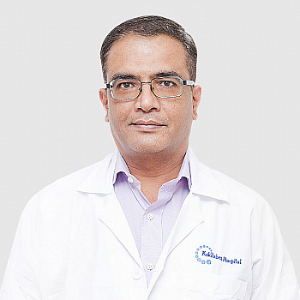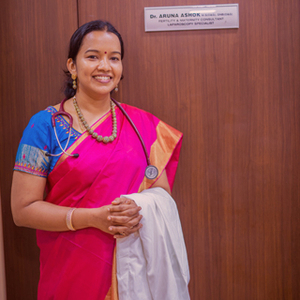Best Doctors in India for Robotic Hysterectomy
- IVF Specialist & Gynaecologist, Kolkata, India
- Over 10 years’ experience
Profile Highlights:
- Dr. Moumita Naha is a consultant Gynecologist and Obstetrician in Kolkata.
- Dr. Naha is one of the best infertility experts in Kolkata and has assisted in achieving several successful pregnancies in women with various fertility issues.
- She is an expert in IVF, IUI, ICSI, management of infertile couples, recurrent IVF failure, recurrent miscarriage, endometriosis, reproductive endocrinology, sexual medicine, and Andrology.
- IVF Specialist & Gynaecologist, Bengaluru, India
- Over 20 years’ experience
Profile Highlights:
- Dr. Mahesh Koregol is a well-known gynecologist and obstetrician in Bengaluru with extensive knowledge and expertise in infertility treatment and Reproductive medicine.
- He provides infertility treatment for both male and female patients that includes IVF, IUI, ICSI, TESA, PESA, sperm analysis, etc.
- IVF Specialist & Gynaecologist, Kolkata, India
- Over 10 years’ experience
Profile Highlights:
- Dr. Akanksha Jangid is a Consultant of Gynecology and Obstetrics in Kolkata currently associated with Indira IVF. The center is a highly specialized unit equipped with the latest technology in Assisted reproductive technology together with state-of-the-art infrastructure and laboratories.
- She is trained in infertility treatment and provides services for IVF, IUI, ICSI, and fertility tests.
- IVF Specialist & Gynaecologist, New Delhi, India
- Over 15 years’ experience
Profile Highlights:
- Dr. Arvind Vaid is a well-known Gynecologist and Obstetrician in Delhi specializing in IVF and infertility treatment.
- He has over a decade of experience in the treatment of infertility and has helped a number of patients in having a child through ART (Assisted Reproductive Technology).
- Dr. Arvind Vaid is trained in various infertility procedures including IVF, ICSI, IUI, and assisted laser hatching.
- IVF Specialist & Gynaecologist, Hyderabad, India
- Over 15 years’ experience
Profile Highlights:
- Dr. Chandana Lakkireddi is renowned infertility and IVF specialist in Hyderabad with expertise in all kinds of assisted reproductive techniques and the management of infertility issues in both males and females.
- She has an extensive experience of 15+ years and finds interest in reproductive endocrinology, management of PCOS, implantation failure, recurrent failed cycles of IVF, miscarriage, endometriosis, and adenomyosis.
- IVF Specialist & Gynaecologist, Chennai, India
- Over 10 years’ experience
Profile Highlights:
- Dr. Erika Patel is a Consultant of Gynecology & Obstetrics in Chennai with experience in infertility treatment and ART.
- With several years of experience in the management of infertility and training in IVF, Dr. Patel works with the goal of making IVF and assisted reproduction highly successful in India.
- She has helped several couples in conceiving a baby without compromising on the quality and by following strict ethical conduct while maintaining complete transparency during the entire process.
- Surgical Oncology, Mumbai, India
- Over 22 years’ experience
Profile Highlights:
- Dr. Yogesh Kulkarni is a well-known name in the field of Gynae Onco surgery.
- He holds an experience of more than 22 years and has performed more than 2000 gyne oncological surgeries.
- Dr. Yogesh Kulkarni has performed over 1000 gyne cancer surgeries in the hospital. He also holds the credit for 500 ovarian, 250 endometrial, 214 cervical cancer surgeries, and 144 robotic cancer surgeries at KDAH alone.
- He gained popularity when he performed the first Reported Fertility Sparing Surgery for Cervical Carcinoma on a 4-year-old for clear cell cervical carcinoma
- IVF Specialist & Gynaecologist, Chennai, India
- Over 15 years’ experience
Profile Highlights:
- Dr. Aruna Ashok is a well-known gynecologist and obstetrician with experience in the treatment and management of all types of gynecological issues and disorders.
- Along with that, she is an experienced and skilled infertility specialist with training in various types of assisted reproductive techniques including IVF, IUI, ICI, and IMSI. She performs infertility surgeries and donor insemination surrogacy among other several procedures.
- She has delivered talks and presented papers at national levels on infertility, IVF, and the advancements being made in ART.
- Obstetrician & Gynecologist; Gurugram, India
- Over 20 years’ experience
Profile Highlights:
- Deepa Maheshwari is a Gold medalist gynecologist and obstetrician in Delhi NCR, having more than two decades of experience in assisting Gynae patients.
- The doctor specializes in infertility estimation and management, Antenatal Care, High-Risk Pregnancy, PCOD/PCOS Treatment, Maternal Care, and Prenatal checkup.
- Obstetrician & Gynaecologist, Gurugram, India
- Over 12 years’ experience
Profile Highlights:
- Dr. Neha Gupta is one of the best Gynecologists and infertility specialists in Delhi NCR, having more than a decade’s experience.
- In her 12 years of experience, she gained expertise in Hysteroscopic and Laparoscopic procedures.
- Urinary incontinence, ectopic pregnancy, Pelvic floor repair surgeries, uterine prolapse, uterine polyps, surgeries for fibroids, etc. are her core specialties.
Best Hospitals in India for Robotic Hysterectomy
MGM Healthcare, Chennai
- City: Chennai, India
Hospital Highlights:
- Located in Chennai, India, MGM Healthcare is a top multispecialty hospital that provides all medical services under one roof.
- Since its founding in 2019, MGM Healthcare has quickly become a leading national referral centre, creating several innovative flagship initiatives.
- MGM Healthcare combines next-generation medical and digital technologies to provide better patient results.
- With 12 centres of excellence, more than 400 inpatient beds, 100 intensive care unit beds, and 24/7 emergency care, MGM Healthcare leaves no chance in redefining the patient experience in Chennai.
- MGM Healthcare boasts 250+ expert doctors across 30+ departments, including Cardiology, Pulmonology, Neurology, Obstetrics & Gynaecology, and more.
- They house 12 specialized Centres of Excellence, including Neurosciences, Orthopaedics, and Multi-Organ Transplantation.
- Their team of doctors, nurses, and paramedics works together to give every patient individualized treatment.
Robotic Hysterectomy
The surgical removal of a woman’s uterus is termed as hysterectomy. This surgery is generally done through a small incision with the help of a thin, lighted scope with a camera on its end.
In a robotic-assisted laparoscopic hysterectomy, the surgeon makes the use of a computer for controlling the surgical instruments. The computer is operated from an operating room. The surgeon controls the robot’s movements steadily and precisely with the help of the computer. This lets him/her get into smaller spaces more easily as compared with conventional laparoscopic surgery.
Purpose
Hysterectomies are performed to treat several conditions, which include:
- Uterine fibroids
- Cancer or precancer of the uterus, ovaries or cervix
- Endometriosis
- Uterine prolapse
- Pelvic pain
- Abnormal vaginal bleeding
Robotic hysterectomy is recommended by your doctor if he/she feels that you are not a candidate for regular hysterectomy due to your medical history. If you have some surgical scars or some irregularity in the pelvic organs, that limits your options.
Preparation
It is likely that you will need some physical exams before the tests. Some of the tests your surgeon can order might include blood tests, a chest X-ray or an electrocardiogram. Let your surgeon known if you are taking any medications or supplements. It is likely that your surgeon will recommend you against taking aspirin or any other medications that thin your blood and can increase bleeding.
If anyone in your family has any history of a bad reaction to general anesthesia, let your healthcare provider know. It is also important to stop smoking as it can interfere with your healing process.
You will need to fast for some time prior to your surgery. If you will receive general anesthesia, it is important to consume nothing after midnight for at least eight hours before your surgery.
You can discuss with your surgeon whether you should continue to take your regular medications on the morning of the procedure.
Procedure
First, you will need to lie on your back. You might have a urinary catheter inserted for emptying the bladder. A member of your surgical team then cleans the surgical area with a sterile solution before your surgery.
After you are given an anesthetic, your doctor will create a few small surgical cuts in your abdomen and insert slender surgical instruments through them.
During the procedure, your surgeon will need to use control devices for directing the surgical instruments that will be removing the uterus.
Depending on your condition, your surgeon might also need to remove one or both of your ovaries and your fallopian tubes. While the surgeon performs the operation, an assistant at the operating table will reposition the instruments and add or remove any surgical devices as needed. He/she will provide any other support to the surgeon if required.
Your uterus is then cut into small pieces so that they are removable through the small incisions. Depending on the reasons for your procedure, your whole uterus might be removed or just the part above your cervix.
After the procedure
After the surgery, you will be taken to a recovery room to be monitored as you recover from the anesthesia. Most people generally require a stay for a few days at the hospital. You might experience some pain after this procedure. To control it, you will likely receive pain medicine through your IV. Once you are able to drink fluids and your bowels start to pass gas, your IV will be removed.
Within a few days, your bladder catheter is going to be removed. You might experience bleeding from your vagina which requires the use of pads. You will be encouraged to get up and walk as soon as you can. This can help in the prevention of blood clots from forming in your legs. You might also receive pain medicine that can help prevent blood clots. Caregivers might help you with your daily tasks.
Once you are home, it is important to follow all instructions provided by your surgeon. You also need to take medications as directed. Make sure that you keep your follow-up appointments.
You need to keep the incision areas dry for a few days. Follow your surgeon’s instructions regarding bathing and dressing care. You might need to go back to him/her to have your stitches removed. In a few days, you should gradually be able to resume your daily activities. Avoid lifting heavy objects for a few weeks. Discuss with your surgeon when you will be able to return to specific activities.
You might continue to have light bleeding from your vagina. You might also receive instructions not to put anything into your vagina for around 6 weeks.
Complete recovery should take anywhere between a few weeks to a few months.
If you experience any of the following, inform your surgeon:
- Increasing pain or pain that medication is not able to relieve
- Chest pain or shortness of breath
- Pain or swelling in your legs
- Any drainage, redness, bleeding or swelling from the incision areas
- Fever
- Heavy vaginal bleeding
In addition to the physical symptoms of recovery, you might also experience a few emotional symptoms. After this procedure, pregnancy is no longer possible and your periods are going to stop as well.
If your ovaries were also removed as part of this procedure, then you might notice few symptoms of menopause such as hot flashes as well as vaginal dryness. Some women might benefit from hormone therapy after going through a hysterectomy. You can choose to discuss this with your doctor.
Risks
A robotic hysterectomy is generally a safe procedure, but like all surgeries, it has a few risks, which include:
- Heavy bleeding
- Blood clots in the legs or lungs
- Infection
- Adverse reaction to the anesthetic
- Damage to the bladder or any nearby organ












